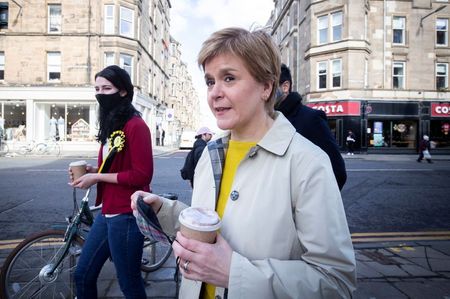Iran accused of attempting to disrupt Scottish Parliament election

Iran has been accused of pushing disinformation online in an attempt to interfere in the Scottish Parliament election.
A report by the right-leaning foreign affairs think-tank the Henry Jackson Society found that “Iran’s activities in cyber space are designed to attack the constitutional integrity of the United Kingdom”.
“There appear to be elements within Iran who are willing to interfere in the United Kingdom’s domestic politics to encourage Scottish separatism,” according to the report.
The study, part of a wider examination of Iranian involvement in foreign elections, said social network analysis firm Graphika dates Iranian online interference in Scotland to 2013.
“From October 2013 to March 2014 Iranian actors produced a Facebook page entitled The Scotsman Cartoon, a name redolent of, but unconnected to the popular daily newspaper The Scotsman,” the authors wrote.
The page offered a series of cartoons in a wide range of visual styles but on a common theme: Scotland’s need for independence. Many of the cartoons attacked then-prime minister David Cameron, portraying him as the embodiment of English oppression, according to the document.
It said the page stopped posting before Scotland’s independence referendum in September 2014 “for reasons that are unclear”.
Fake online persona
Regarding more recent attempts to influence Scottish politics, the society’s report highlights an account closed by Facebook of a “fake Iranian online persona mocking the Scottish Conservatives”.
This was one of 446 accounts the social media giant closed for violating its policies against foreign interference, according to its February 2021 Coordinated Inauthentic Behaviour Report.
The following month Facebook again took action against Iranian-controlled accounts and it said most of the activity was targeted towards Iraq, but was also aimed at Israel, Afghanistan and the UK.
The society’s report quotes coverage in The Times, which said: “The people behind this activity posted memes, political cartoons and other content in Arabic, English, Pashto and Hebrew about news and domestic politics in each targeted country, including Scottish independence from the UK, criticism of Israeli prime minister Netanyahu and US influence in Iraq and Afghanistan. They also briefly mentioned news about Covid-19.”
The society’s report states: “Whilst there is no suggestion that Scottish nationalist politicians have encouraged or endorsed Iran’s interference, it sets a troubling precedent with the issue of a potential second referendum on Scottish independence a deeply contentious one.”
“Iran has shown itself to be a country which engages in Russian-style disinformation campaigns, repeatedly establishing fake websites and internet accounts in an effort to disrupt the political systems of liberal democracies.”
“Judged within this context, Iran is almost certainly looking to disrupt our current elections, most likely those under way for the Scottish Assembly (sic).”
National security issues
Questioned about the report on BBC’s Good Morning Scotland radio programme, Foreign Office minister James Cleverly said the Government was “unwilling to comment on national security issues of this type.”
However he said the Government did have serious concerns about Iran’s “destabilising behaviour” in the Middle East and more broadly.
“How the international community responds to these kinds of accusations or concerns about cyber actions will be one of the things on the agenda of the G7 meeting that the Foreign Secretary will be hosting with foreign ministers from our economic and international partners,” Cleverly added.
An SNP spokeswoman said: “The SNP will always work to counter the spread of disinformation. That is why we led the calls for the Russia report to be published, so work could start sooner rather than later to tackle the threat of foreign interference in UK and Scottish politics.
“However, we have been disappointed by the slow nature of the UK Government’s response,” she added.